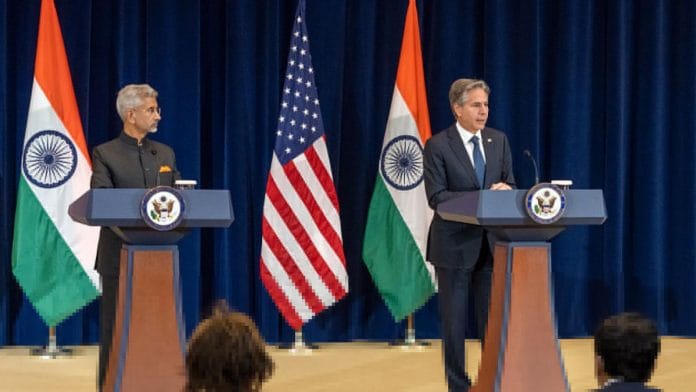New Delhi: Days after External Affairs Minister S. Jaishankar raised questions over US-Pakistan bilateral ties, New Delhi conveyed its objection to Washington over American envoy Donald Blome’s visit to Pakistan-occupied Kashmir (PoK) and him calling it “Azad”.
Arindam Bagchi, spokesperson, Ministry of External Affairs (MEA), Friday said at a media briefing, “Our objection to the visit and meetings in PoJK [Pakistan-occupied Jammu and Kashmir] by the US Ambassador to Pakistan has been conveyed to the US side.”
This comes after Jaishankar’s 10-day visit to the US last month where he met top officials of the Joe Biden administration — from Secretary of State Antony J. Blinken to Defence Secretary Lloyd J. Austin.
The objections have been raised by India to the US across “all levels” both in New Delhi, as well as in Washington, top-level sources told ThePrint.
Sources said, India has also raised concerns over the US’ increasing strategic alignment with Islamabad even as it has “registered its complaint strongly” with the Biden administration, which got a boost with the approval of $450 million for Pakistan’s F-16 programme.
US Ambassador to Pakistan Blome visited Pakistan earlier this week “to promote the U.S.-Pakistan partnership and highlight the two countries’ deep economic, cultural, and people-to-people ties”, said a press note issued by the US Embassy, which also referred to PoK as “Azad Jammu and Kashmir [AJK]”.
“In his meetings, Ambassador Blome emphasised that the United States is continuing this strong tradition of supporting Pakistan during times of great need, having thus far contributed more than $66 million in cash, food, shelter, and health assistance in response to the devastating flooding,” the statement added.
It also said that the US support included a US military airbridge that delivered lifesaving supplies to the people of Pakistan.
“The United States is Pakistan’s largest export market and American companies have been leading investors in Pakistan for the past 20 years. In the past year alone, U.S. investment in Pakistan increased by over 50 percent, reaching its highest level in over a decade,” the statement said.
Sources have not ruled out the fact that calling PoK as AJK may be a “retaliation” of sorts for India’s stance on the Russia-Ukraine war, as Washington is “fully aware” of the fact that “India considers the entire Jammu and Kashmir to be an integral part of the country”.
Interestingly, the US has not yet appointed its envoy to New Delhi, whereas in all other South Asian countries, American ambassadors have taken charge since Biden came to power in January 2021.
On Wednesday, the US had issued a new travel advisory for its citizens asking them to “exercise increased caution” while traveling to India due to “crime and terrorism”. It put India at ‘Level 2’ of 4 levels of travel advisory. ‘Level 4’, the lowest, states “Do Not Travel”.
Also read: India is watching the Russia-Ukraine war. And Biden is watching Modi
India, US tensions on the rise?
In the past month, US and India — considered to be close allies — have locked horns often, ever since the Biden administration sanctioned $450 million for Pakistan’s F-16 fighter jet fleet sustainment programme.
During his visit to the US, Jaishankar had even said Washington should reconsider its ties with Islamabad. “So, it is really for the US today to reflect what are the merits of the relationship, what do they get by keeping it continuing,” he said, pointing to the fact that the US is well aware where Pakistan stations the F-16s.
According to Blinken, “Pakistan’s [F-16] programme bolsters its capability to deal with terrorist threats emanating from Pakistan or from the region. It’s in no one’s interest that those threats be able to go forward with impunity, and so this capability that Pakistan has had can benefit all of us in dealing with terrorism.”
Meanwhile, the US imposed sanctions on a Mumbai-based petrochem company for engaging in oil trade with Iran.
(Edited by Zinnia Ray Chaudhuri)
Also Read: USAF secy needs Pentagon escort but Indian attaché doesn’t — that’s how deep India-US ties are






